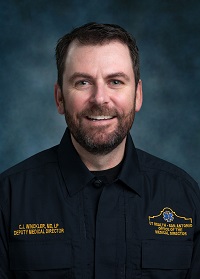EHS faculty is focused on saving lives prehospital with whole blood

By Kate Hunger
San Antonio is pioneering whole blood transfusions for trauma patients in prehospital settings, through a collaboration among area institutions, including UT Health San Antonio.
UT Health San Antonio is one of the institutions collaborating with The Southwest Texas Regional Advisory Council (STRAC) to study the impact of using cold stored whole blood and transfusing injured patients in the prehospital setting.
The effort means that emergency responders are now able to transfuse blood on ground ambulances, said C.J. Winckler, M.D., LP, emergency health sciences assistant clinical professor, Winckler is deputy medical director for the San Antonio Fire Department and is co-appointed in the departments of Emergency Health Sciences and Emergency Medicine.
Whole blood was placed on medical response helicopters in January 2018 and more recently was placed on five SAFD/EMS supervisor vehicles and two ambulances, Winckler said. He noted that SAFD is funding the whole blood, and that STRAC is using funding through the Remote Trauma Outcomes Research Network (RemTORN) to pay for equipment. The process includes using special coolers to keep the whole blood between 1 and 9 degrees Celsius, even in high ambient temperatures. High-speed warmers are used to instantaneously warm up the blood in order to transfuse it.
Winckler is researching whether whole blood transfusions save lives when given to patients in hemorrhagic shock before they arrive at a hospital. Research has shown the life-saving benefit of whole blood transfusions on the battlefield.
“When troops needed blood, they gave whole blood. It saved countless lives,” Winckler said of the practice of whole blood transfusions during World War II and the Korean and Vietnam wars.
“There aren’t any civilian studies that prove whole blood saves lives,” Winckler explained.
Winckler said that while his research involves trauma patients, understanding the benefit of whole blood for medical patients is also important.
“We have 31 patients we have transfused since October prehospital,” as of Dec. 18, he said. Three-fourths of the transfused patients were trauma cases and the remaining patients were medical cases.
“We need evidence-based medicine,” Winckler said of the need to show the benefits of whole blood transfusion. “We just have the right team in San Antonio and we’re going to prove it, I hope.”
Winckler has taken his involvement in the program even further. He donates whole blood through Brothers in Arms, a special donor program through the South Texas Blood and Tissue Center. Donors must be male and have low-titer O-positive blood in order to participate. Also donating whole blood is David Wampler, Ph.D., LP, FAEMS, EHS associate professor and director of clinical research for the Office of the EMS Medical Director. There are about 500 donors participating in the program, Winckler said.